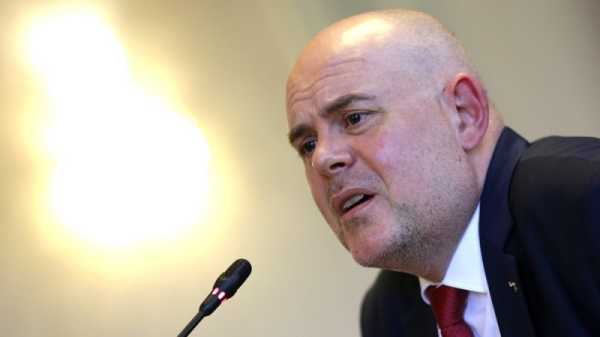
Replacing a prosecutor general whose inadequacy for the job became plain to see following an alleged assassination attempt should be the first step in reforming the Bulgarian judiciary, writes Nick Kochan.
Nick Kochan is a UK-based freelance journalist who writes about corruption and economic crime.
The announcement on 11 May by Mariya Gabriel, Bulgaria’s prime minister-designate, that she would take steps to have the prosecutor general removed from office once she had set up her cabinet, is good news for justice and for Bulgaria’s reputation abroad.
Indeed, it is long overdue. The country’s reputation for a highly politicised justice system has been identified as one of its key weak points as it seeks acceptance by Western nations and this move would be regarded as a first step in acknowledging that it has a problem.
The EU, and the United States should welcome it.
No justice system is flawed by one individual, and Bulgaria’s government undoubtedly has work to do on its structures of justice. But the prosecutor general Ivan Geshev has attracted more opprobrium as the architect of the politicisation of Bulgaria’s justice. As its attorney general as well as lead prosecutor, he is also its most obvious face.
Geshev’s problem is not merely that he has fought tooth and nail to hold onto a number of prosecutorial powers that are widely regarded as excessive – indeed he has enjoyed greater authority over the judicial and prosecutorial system than any other of his European counterparts.
It is also that he is widely seen as making decisions to use these powers in ways that look after the interests of his political friends, at the expense of the country.
In terms of his excessive powers, this prosecutor general has complete sway over decisions to initiate, prolong or close an investigation, and has to pay no heed to fellow prosecutors who have contrary opinions. In the event that his decisions are challenged, he holds virtual immunity from prosecution.
This is an untouchable position against which many have rubbed to their cost.
One awkward adversary whom the prosecutor general sought to subdue was the country’s President Rumen Radev. This surfaced in July 2020, when Geshev sent his own police into the office of an adviser to Radev, to search his office.
The feud resurfaced when the interim interior minister Boyko Rashkov accused Geshev of illegally publishing transcripts of conversations between politicians, which included Radev. This was a criminal act that should be prosecuted, argued Rashkov.
The matter was reported to the Justice Ministry in July 2021, to no avail.
The arrest of Bulgaria’s former prime minister Boyko Borissov in March 2022 was symptomatic. It had been unthinkable until that point that police would turn against Borissov, a politician on whom Geshev relied for support.
The move against the former prime minister represented a tectonic shift in the Bulgarian judicial plates. Borissov was released within twenty-four hours but the landscape had been changed for good.
Forces elsewhere appeared also to have woken up to the imperious and dangerous impact that the prosecutor general was having on the Bulgarian judicial system. They too were demanding change.
These included an American congressman, Warren Davidson, who wrote to Janet Yellen, the US Treasury Secretary, identifying the malign influence of the prosecutor general on Bulgarian justice.
He contended that Geshev had colluded in the protection from prosecution of Delyan Peevski, a wealthy businessman and strong supporter of Borissov and Geshev.
Peevski, together with a number of other Bulgarian businessmen, had been placed on the US sanctions list under the US Magnitsky legislation, but Bulgaria failed to follow up with their prosecution.
The first sign that Bulgaria’s politicians were prepared to strip Geshev of some of his power occurred in the last parliament when authority over the department that gave physical protection to politicians and high-profile Bulgarians was removed from the Attorney General’s office and handed over to the Ministry of Justice.
Geshev saw this as a threat to his position and that may explain his extraordinary claim that he was the target of a so-called assassination attempt on 1 May.
It now looks like this was designed to show how vulnerable Geshev was to attack. But discrepancies in the accounts of the incident given by his deputy prosecutor general and Geshev’s own office suggested that the incident, a Waterloo in terms of public relations, was a moment of truth revealing Geshev’s inadequacy for the job.
What the incident did do, however, was give Mariya Gabriel the impetus to try to gather support to form a government. Obviously, it was not her decision, she acted upon Borissov’s instructions.
But those who were calling most ardently for Geshev’s removal – the party “We continue the change” of former prime minister Kiril Petkov – were the first to warn that replacing the person would not solve the serious problems of the Bulgarian judicial system.
Indeed, there is no certainty that the system will change but Bulgaria’s judicial system has lived with the fear of Ivan Geshev and his office for too long. The quicker his power and influence are curtailed the better. Once that occurs, a sigh of relief will be heard throughout the country.
Source: euractiv.com



